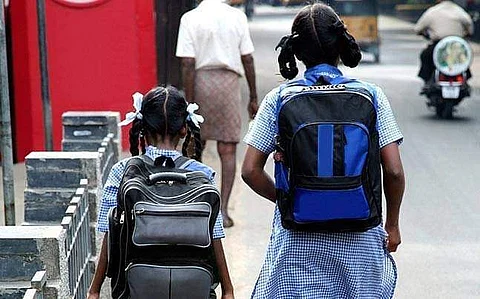

As a result of not being in school for 17 months, owing to the COVID pandemic, over 48 per cent of rural Indian children cannot read more than a few words. This rather scary statistic is the result of a survey of school children conducted in August 2021, by over a hundred volunteers, mostly university students, under the supervision of leading academics such as Jean Drèze, Nirali Bakhla, Reetika Khera and Vipul Paikra. The situation is grim in urban areas as well where 42 per cent of urban children couldn't read more than a few words.
Nearly 1,400 school children from Grade 1 to Grade 8 were surveyed for this report titled Locked out: Emergency Report on School Education. The survey was conducted across 15 states and union territories including Tamil Nadu, Maharashtra, West Bengal, Madhya Pradesh, Uttar Pradesh, Karnataka and so on. Nearly 60 per cent of the students surveyed hailed from rural, disadvantaged homes.
Can you read me?
The inability to read is worse in children from Grade 3 to Grade 5, wherein 35 per cent urban students and 42 per cent rural students couldn't read more than a few letters. What is probably dragging the average upward is that 65 per cent of children in Grade 2 of urban areas and 77 per of rural areas could not read more than a few letters. What is important to remember here is that those enrolled in Grade 2 have never been to school as they started their Grade 1 last year during the lockdown.
None of the 20 Dalit and Adivasi children interviewed in the Kutmu village in Jharkhand's Latehar district, where most households are Dalit and Adivasi, could read a word. According to the report, the teacher belongs to an upper-caste family and some people in the village openly asked the survey team, “If these (SC/ST) children get educated, who will work in our fields?"
The digits just don't add up
The major reason for these kids having an inability to read is their lack of access to education — whether online or otherwise. While a majority of students in urban settings had access to high-speed internet, devices capable of online education and a conducive atmosphere at home, those factors were often stacked against the kids from rural areas. According to the report, 49 per cent of those surveyed in rural areas do not live in a family that owns a smartphone while 77 per cent of those living in urban areas have a smartphone at home.
What adds to the damage is the fact that 43 per cent of children in the rural areas said that they are not studying online regularly because no online material was sent to them by the school — in contrast, only 14 per cent of the kids in urban areas had this complaint.
Another major shocker was the high percentage of children who listed network issues among the top reasons for why they didn't really learn much during the pandemic. According to the report, internet connectivity is not just a 'rural problem'. While 65 per cent of children surveyed reported network issues in rural areas, 57 per cent of children said the same about internet connectivity in the urban areas.
What is, however, heartening is that 31 per cent of children surveyed in rural areas said they sometimes study without family members' help while 30 per cent of the children from urban areas said the same.
What comes next?
"It will take years of patient work to repair this damage. Reopening schools is just the first step," the report reads. While schools have reopened for higher classes in several states, policymakers are still in a dilemma on whether to reopen primary schools. Of those surveyed, 74 per cent in urban areas were students studying in a Government school — a number that shot up to 84 per cent in rural areas.
